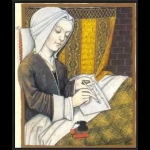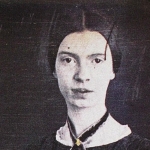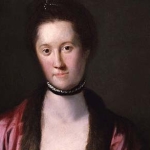Here Follows Some Verses Upon the Burning
of Our house, July 10th. 1666. Copied Out of
a Loose Paper.
of Our house, July 10th. 1666. Copied Out of
a Loose Paper.
In silent night when rest I took,
For sorrow near I did not look,
I wakened was with thund’ring noise
And piteous shrieks of dreadful voice.
That fearful sound of “fire” and “fire,”
Let no man know is my Desire.
I, starting up, the light did spy,
And to my god my heart did cry
To straighten me in my Distress
And not to leave me succourless.
Then, coming out, behold a space
The flame consume my dwelling place.
And when I could no longer look,
I blest His name that gave and took,
That laid my goods now in the dust.
Yea, so it was, and so ‘twas just.
It was his own, it was not mine,
Far be it that I should repine;
He might of all justly bereft
But yet sufficient for us left.
When by the ruins oft I past
My sorrowing eyes aside did cast
And here and there the places spy
Where oft I sate and long did lie.
Here stood that trunk, and there that chest,
There lay that store I counted best.
My pleasant things in ashes lie
And them behold no more shall I.
Under thy roof no guest shall sit,
Nor at thy Table eat a bit.
No pleasant talk shall ‘ere be told
Nor things recounted done of old.
No Candle e'er shall shine in Thee,
Nor bridegroom‘s voice e'er heard shall be.
In silence ever shalt thou lie,
Adieu, Adieu, all’s vanity.
Then straight I ‘gin my heart to chide,
And did thy wealth on earth abide?
Didst fix thy hope on mould'ring dust?
The arm of flesh didst make thy trust?
Raise up thy thoughts above the sky
That dunghill mists away may fly.
Thou hast a house on high erect
Frameed by that mighty Architect,
With glory richly furnished,
Stands permanent though this be fled.
It‘s purchased and paid for too
By Him who hath enough to do.
A price so vast as is unknown,
Yet by His gift is made thine own;
There‘s wealth enough, I need no more,
Farewell, my pelf, farewell, my store.
My hope and treasure lies above.





















Comment form: